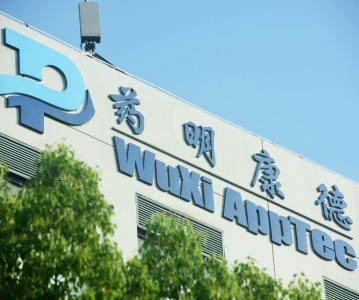Bright Future Ahead for Biopharmaceutical Contract Manufacturing

Considerable growth opportunities lie ahead for biopharmaceutical contract manufacturing organisations (CMOs). With blockbuster biologics worth more than $100 billion due to lose patent protection by 2019, the global biosimilars market is projected to grow at a robust compound annual growth rate (CAGR) of 60.4% between 2012 and 2019.
A new market insight from Frost & Sullivan, "Biopharmaceutical Contract Manufacturing," finds advances in bioprocessing technologies, as well as innovation in biopharmaceuticals production with transgenic plants and animals, stem cells and cloning, are likely to have a direct impact on the market.
“Due to the steep cost and long time needed to build, equip and validate a biomanufacturing facility, the majority of biopharmaceutical companies prefer leveraging the expertise of CMOs,” notes Frost & Sullivan Healthcare Senior Research Analyst Aiswariya Chidambaram. “CMOs have made substantial investments in infrastructure, technology, and personnel in recent years, and are capable of providing uncomplicated, timely, and cost-effective services. They are also well versed with regulatory compliances and work closely with regulatory agencies, thereby reducing time-to-market.”
Disposable technology is a key biomanufacturing trend and presents attractive opportunities for minimising production costs, owing to its customisable design, enhanced productivity, and significant operational benefits. Disposable equipment and single use bioreactors are considered a viable alternative to conventional stainless steel equipment, due to their flexibility, short start-up time, quick changeover between production campaigns, and absence of clean in place, steam in place, and large volumes of water for injection. Single-use technologies are specially designed for multi-product contract manufacturing with additional benefits, such as simple transfer of operations between sites and their ability of being easily expandable for larger volumes.
Advances in upstream and downstream processing technologies will also affect the industry. With 20% of biotech manufacturing costs accounting for upstream processing activities, and 40% for downstream ones, most companies and CMOs are gearing up to adopt new technologies to optimise efficiency. In 2011 the global industry witnessed a 6.2% budget increase for integrating new technologies in upstream processing. Reduction of quality variability in the product — impurities such as aggregates, glycosylation variants, and so forth — and cell viability will be the key focus areas of upstream processing in biomanufacturing. Downstream processing technologies follow two different trends specific to mAbs and recombinant proteins, specifically in the purification processes. In the next 5 years, exploration of alternative purification methods will be crucial for CMOs.
Advances in lyophilisation and increasing applications of process analytical technology (PAT) will also attract attention. Innovations such as automated loading processes into the dryer in place of manual loading contribute to minimising human error and maximising productivity. Also, manufacturers increasingly prefer the implementation of PAT and standardisation of their processes, rather than relying on the validation of finished products. Near infrared spectroscopy (NIR) is one of the latest technologies that provides potential real-time control of cells in fermentation, specifically in mammalian cell culture processes. The significant enhancement of purity levels and product efficiency are expected to drive the demand for this novel technology throughout the forecast period.
Mammalian cell-based contract manufacturing is expected to sustain the industry’s future expansion. This segment currently constitutes nearly two thirds of the sales revenue of the global biopharmaceutical contract manufacturing market and is anticipated to grow as high as 65% during the next 5 years, at a significantly higher rate than microbial cell-based contract manufacturing segment.
Increasing adoption of the Large Molecules model by big pharma companies will also boost prospects. Of the top 15 pharmaceutical companies, nearly 80% are expected to experience a net growth in their biologics portfolio. The big pharma shift to large molecules will likely be led by monoclonal antibodies (mAbs) and is projected to grow at a CAGR of 10.8% from 2012 to 2017.
Companies will also increasingly outsource crucial operations and will seek to adopt an integrated/risk-sharing business model. The aim is to provide a “one-stop-shop” option for the biopharmaceutical companies where they can exploit the resources and expertise of the CMOs to reap maximum benefits, while they concentrate on their core capabilities and R&D activities.
Industry consolidation in the form of mergers, acquisitions and strategic alliances between CMOs, biopharmaceutical companies and technology providers are likely to increase, so as to gain access to newer geographies, niche product segments, and latest technologies. Targeting the right market niches will be crucial for long-term sustenance.
“As biopharmaceutical companies continue to focus on improving efficiency and productivity at lower costs” concludes Chidambaram, “CMOs are required to achieve the same internally through better integration of services and remaining at the forefront of technology.”
Related News
-
News WuXi to sell CGT manufacturing unit to US-based Altaris LLC
At the tail end of 2024, Chinese-based CDMO WuXi AppTec announced the signing of their deal with private equity firm Altaris LLC, confirming the sale of WuXi Advanced Therapies, the cell and gene therapy manufacturing arm of WuXi AppTec. -
News Women in Pharma: Our hopes for 2025 and beyond
Our last instalment for 2024 of the Women in Pharma series brings you messages direct from the Informa Markets CPHI team as they discuss the advice and insights they have carried throughout their roles working at CPHI, and what they hope to see for the... -
News CPHI Milan Wrap-Up Report: Conference Highlights
Discover the emerging and trending topics of the pharmaceutical industry with our CPHI Milan Conference Highlights, with exclusive insight from pharmaceutical leaders and experts! -
News BIOSECURE Act not included in key defense spending bill for 2025
On December 7, 2024, the Biden administration revealed the 2025 National Defense Authorization Act, an annual defense bill specifying the budget and expenditures of the US Department of Defense. The controversial BIOSECURE Act was notably missing from ... -
News Lessons from CPHI Milan 2024: Sunny Intervals for Pharma Manufacturing?
As the 2024 CPHI conference wrapped up in Milan, we caught up with L.E.K. Consulting – a global strategy consulting firm with deep expertise in pharma manufacturing – to discuss evolving market perspectives and business outlook. -
News Trump 2.0: What does the US election result mean for the healthcare industry?
After Trump won the Presidential election in the US in early November, we take a look at some of the implications a new Trump administration could have on the health and pharmaceutical industry, and on US patients. -
News Women in Pharma: Reflections from Behind the Scenes
In this instalment of our monthly series, the team that brings you the Women in Pharma series each month sits down for a heart-to-heart on what the series means to them, and how they hope to continue their work in the future. -
News Scaling the Industry: CPHI Scale-Up Market interview with YSK Laboratories
For the first time, CPHI Milan hosted the CPHI Start-Up Market, expanding support for emerging and small-sized enterprises in their transition to the next level of growth. In this interview, we spoke with Yuvansh Khokhani, Managing Director of YSK Labo...
Position your company at the heart of the global Pharma industry with a CPHI Online membership
-
Your products and solutions visible to thousands of visitors within the largest Pharma marketplace
-
Generate high-quality, engaged leads for your business, all year round
-
Promote your business as the industry’s thought-leader by hosting your reports, brochures and videos within your profile
-
Your company’s profile boosted at all participating CPHI events
-
An easy-to-use platform with a detailed dashboard showing your leads and performance

.png)





